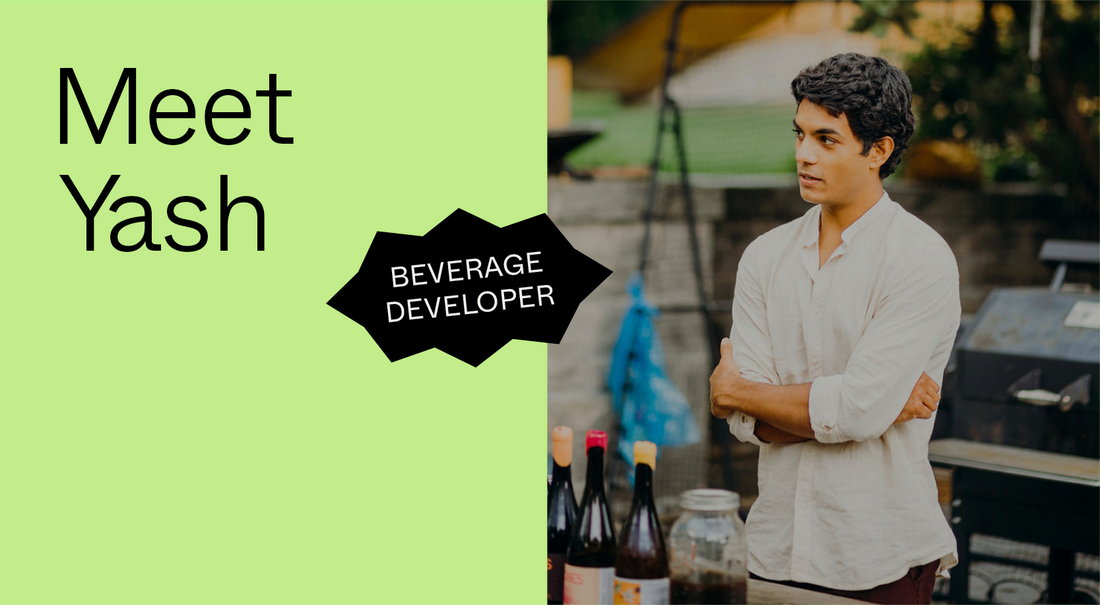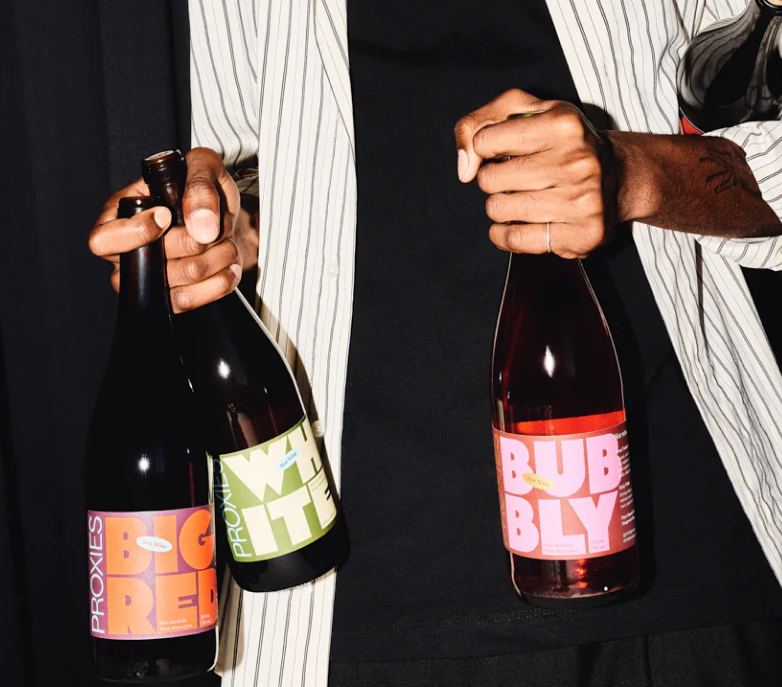
The Mixmaster Behind Proxies
Share
Ever take a sip of our Proxies and wonder “how do they come up with this stuff?” The answer largely lies within the mind of Yash Raghuvanshi, our Beverage Developer, whose main focus is working on three new blends for our Proxies Club every single month.
Yash’s career has spanned two continents and several disciplines: After getting his start on-staff at the Mumbai Grand Hyatt and undergoing bartender training, he moved to Canada, where he got his WSET 3 certification and took a job making bitters at BarChef, a Toronto bar known for elaborate molecular drinks. (For a time, he also worked in the kitchen at Kasa Moto, an upmarket sushi restaurant in the city's Yorkville neighborhood.)
A search for more stable work during the pandemic led him to the production department at Acid League, where he soon became a beverage developer, helping to shape the Proxies product line.
We talked to Yash about the unique, mind-bending flavor alchemy that comes with creating a (non-wine) wine alternative.
How do you fit into the Proxies development team?
So there's the DTC (direct-to-consumer) subscription that we have, where we do three new wines every month. We have to come up with the concept and themes for it every month, which is kind of hectic—and also a lot of fun. There’s very tight timelines within it.
I also work on the wholesale Proxies, sometimes just modifying recipes and on other projects, like improving shelf life and stability. Also, any collabs that are happening.
It sounds like your job at Acid League is probably closest to what you were doing at BarChef—this sort of flavor alchemy, “how do we take this flavor and distill it into a drink? How do we pair it with other things?” How did that sort of inform the Proxies process?
You’re right that it’s less about traditional wine, and more about managing flavors. Since we can’t use the alcohol, it's a very different process. But we do have ingredients, like wine grape juice that you have to use in the correct ratio, just to make sure it feels like wine.
What was some of the stuff you were developing at BarChef?
It was already a very established restaurant. There wasn’t much that I could add, but I learned a lot just from being part of what was happening. We had five bitters we had to make almost every week. I was in the kitchen and we were making modernist cocktails. I was on the cryo station, working a lot with dry ice and liquid nitrogen, and making edible components for the cocktails.
I love that they call it the “cryo station”.
It is pretty cool. When I joined it was quite busy, because it was 2018. I was super bad at it initially, and it was difficult to get a hang of it. It was also my first proper job in Canada, so I was just trying to understand everything. As I got used to it, I was given more responsibilities—I was taking care of the cryo station, my feedback was taken whenever new cocktails would come up.
Would you say there’s a big difference between the hospitality industry within India and the hospitality industry here?
The values are similar, where we give the customers or guests priority. But I feel like there are more opportunities in Canada. Like, people are more willing to give you an opportunity to prove yourself as compared to India, where they already want you to have the experience for something.
What drew you to Acid League?
In 2020 and early 2021, I’d been looking for a wine job because there was so much uncertainty about the restaurant industry. So I just wanted to step away from it for a bit.
I had a background in wine, and I wanted to pursue winemaking. And then I saw this position at Acid League. That was when the Proxies were in, like the first month, and they were just starting to make it. I thought it sounded interesting. They said that they were blending a lot of spices and teas to make this non-alcoholic wine alternative. I wanted to try my hand at it. I knew that because of my background in the kitchen and my background in wine, this was something I could definitely do.
It sounds like you were given a lot of like a leeway to just experiment and make stuff up from the jump.
Yeah. When I started off initially, Devin (Devin Campbell, our Head of Beverage Development) just gave me a bunch of teas to brew, just to see what they were like. Now I have a shelf full of teas and spices and bitters in my home. It’s literally my whole room. It’s just Acid League everywhere.
I would love to be a fly on the wall for that process—like a painter looking at a giant palette of paints. What's the creative process like for you? How do you generate Proxies ideas and then build them out?
It's a lot of trial-and-error. Sometimes you get lucky and you hit it right off the bat, but many times it gets frustrating when you have to go through like five, six iterations, and it's still not coming together.
Initially we usually decide on a theme, when we start making Proxies. But I try to keep it in alignment with the touchpoints of actual wine. So, for example, for an upcoming month I made a cool-climate red, which is a bit herbal. So I looked up some of the cool-climate wines, see what the standout notes are and like what fruits usually you find, what spices are very common.
I've made a lot of mistakes making Proxies, and I've learned a lot from them. Now I know which ingredients to stay away from, and which ingredients I can rely on if something's going wrong.
Are there any ingredients you found that straight-up don't work in Proxies?
Smoky flavors can be tough. I'm trying that again though right now—I’m using a lapsang tea, which is a smoky tea. I’ve used that before and it didn’t work out well. Some mint flavors are tough because it can turn everything super minty, which is not ideal. Hojicha is a very funky tea that can turn the whole balance very funky. Genmaicha is tricky too.
I can imagine there are things that you’d love to use, but you either can't get it or it's expensive or it's just impractical. What do you do at that point?
Yuzu juice was difficult to source because there's no production of yuzu in Canada—it's only sourced from Japan, and it takes time to get here. So, the lead time is three months, which is not what I have, because we usually have to deliver new Proxies every month.
Is there anything that you really want to use in Proxies that you haven't yet?
I haven't used tamari yet. I have a theme in mind for an umami month, where I want to make a rosé or like a light red style of wine with tomato, and tamari, and some strawberries. So it's gonna be, like, a mild use of tamari, very light on the umami, but the tomato and the strawberry are going to complement each other, and it kind of helps the tamari shine. I haven't used it yet—it's just an idea.
Part of the process is looking at other wines for tasting notes so you can pull inspiration. But does it get to a point where it becomes too literal? Like, “I put all the stuff from the tasting notes from this wine together, and it just tastes like a mix of the stuff?”
So many times. For example, I look at syrah, and I see this black peppercorn and there's eucalyptus and like blueberry and a lot of black fruits.
But it's not added to the wine—it’s something that grows into it, through the process of fermentation. And when you do that, but just adding a bunch of stuff to grape juice, it’s like a spiced tea, kind of. You have to make sure that you're not too literal with it.
Proxies aren't meant to taste like wine, it's just an alternative to wine. That’s something to be very considerate of, because you cannot make your wine Proxies taste exactly like wine. It's not possible.
You just have to see what people expect when they drink wine, and what flavors they’re more comfortable with.
How often do you set out to make something that reflects a real wine style, and how often do you go, “These flavors would be cool together, and I just want to make something up?”
Most of the time, I make something up. We have done wines that are very symbolic of the original grape varietal. For example, Pastiche is very similar to a Gewurztraminer. Even the floral notes and the flavor profile and the acidity is kind of very much in line with a Gewurz.
I've tried doing a madeira, like a sweet style oxidized wine. That was very not what I was expecting it to be, because I used a lot of flavor profile notes from from a madeira, and it didn’t work out as much as I wanted it to. But it has shown a possibility to age, which is pretty weird and pretty cool.
I've tried to make a cool climate syrah, and obviously it didn’t taste like a syrah, but there were some notes that matched it.
That’s cool, though, because if you know that you're never gonna exactly replicate a wine—because that's just not how it works, right?—it’s almost more freeing.
Yeah. That's a good thing about Proxies. We don't have a point of reference, so no one can actually compare it to anything. It's also a limitation, because you don't have a lot of sources to look to.
Where would you like to see Proxies go, and what would you like to see happen in the future?
I mean, I like how the Proxies are going right now. It's not super huge, but we’re in very key places in North America. I wanted to go into restaurants first and then go wholesale, so that gives us the credibility and the word of mouth to just spread the word. It’s doing well, and it’s being served in some very high end restaurants, so that it gets that name (recognition)—and then we can move abroad, which will help deliver that message to other countries as well.
Anything else you'd like the people to know?
I think people should be more open to us experimenting, trying to provide an alternative to a beverage world that’s so saturated with alcohol. I’m not just talking about Acid League, but every other company in the non-alcoholic world. I think they should be given more acceptance, in a sense. Just try it and see! If you don’t like it, you don’t like it—but be willing to try it.
Lightning round!
Fave Proxy? Nashi.
Favorite Non-Proxies AL product? Nam Prik Pla (RIP).
Favorite style of wine? A cool climate red.
Favorite Toronto restaurant/bar? Paradise Grapevine.
Favorite midnight snack? Grilled cheese sandwich.
How do I like my eggs? I like an omelet.
And finally: Is a hot dog a sandwich? Yes.
Want to see what Yash has been working on? Check out our latest Proxies Club selections.





